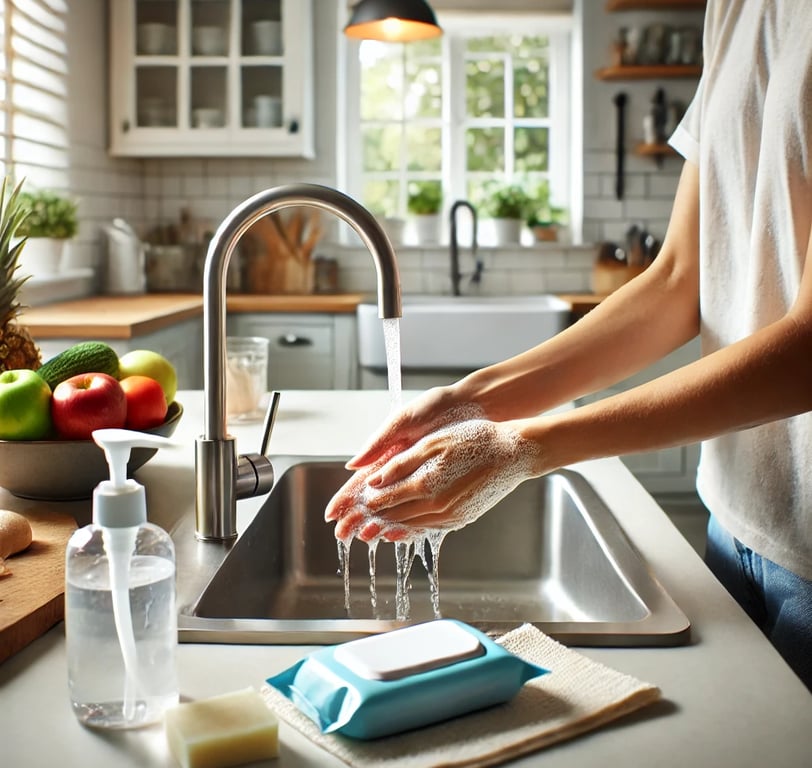5 Effective Ways to Protect Yourself from Norovirus
Keep you and your family safe this season from norovirus.
HEALTHSELFCARETOP 5LIFESTYLE
1/9/20253 min read


5 Effective Ways to Protect Yourself from Norovirus
Norovirus, often referred to as the “stomach flu,” is a highly contagious virus that causes sudden and severe gastrointestinal distress. While it’s not typically life-threatening for most healthy individuals, its symptoms—vomiting, diarrhea, stomach cramps, and nausea—can be incredibly unpleasant and disruptive. Protecting yourself from norovirus requires vigilance and good hygiene practices. In this post, we’ll explore five effective ways to protect yourself and your family from this common yet avoidable virus.
1. Practice Excellent Hand Hygiene
One of the most effective ways to prevent norovirus infection is by maintaining proper hand hygiene. Since the virus can spread through contaminated surfaces, food, and water, clean hands are your first line of defense.
Wash your hands frequently: Use soap and water, scrubbing for at least 20 seconds. Pay extra attention before eating, after using the restroom, and after touching potentially contaminated surfaces (like doorknobs or public transport handles).
Use hand sanitizer with caution: While alcohol-based hand sanitizers can reduce germs, they are not as effective against norovirus as soap and water. Use sanitizer only when soap and water are unavailable.
Teach children proper handwashing: Encourage kids to wash their hands thoroughly, especially after playing, using the bathroom, or coming home from school.
By making hand hygiene a habit, you can significantly reduce your risk of contracting or spreading norovirus.
2. Disinfect Surfaces Regularly
Norovirus can survive on surfaces for days, making it crucial to disinfect areas where germs are likely to linger. Regular cleaning reduces the likelihood of accidental contamination.
Use the right cleaning solution: A solution with bleach is most effective at killing norovirus. The CDC recommends using a mixture of 5 to 25 tablespoons of bleach per gallon of water.
Focus on high-touch surfaces: Regularly disinfect items such as countertops, doorknobs, light switches, remote controls, and smartphones.
Don’t forget soft surfaces: While bleach isn’t ideal for fabrics, laundering linens, clothes, and towels in hot water with detergent can help eliminate the virus.
Clean after illness: If someone in your household has been sick, immediately disinfect surfaces they’ve touched and clean up any bodily fluids with gloves and disposable paper towels.
Consistent cleaning helps create a safer environment and minimizes the risk of spreading the virus.
3. Handle and Prepare Food Safely
Contaminated food is one of the leading causes of norovirus outbreaks. Proper food handling practices can significantly reduce the risk of exposure.
Wash fruits and vegetables thoroughly: Rinse all produce under running water, even items you plan to peel.
Cook seafood thoroughly: Raw or undercooked shellfish, such as oysters, can harbor norovirus. Ensure all seafood is cooked to the appropriate internal temperature.
Avoid preparing food when sick: If you’re experiencing symptoms or recovering from illness, refrain from cooking or serving food for others until at least two days after you’ve fully recovered.
Practice cross-contamination prevention: Use separate cutting boards and utensils for raw meat, fruits, and vegetables, and regularly sanitize your kitchen tools.
Safe food handling not only protects against norovirus but also prevents other foodborne illnesses.
4. Be Cautious in Crowded Spaces
Norovirus spreads easily in close quarters, which is why outbreaks often occur in schools, cruise ships, nursing homes, and workplaces. Being mindful of your surroundings can help you avoid exposure.
Avoid touching your face: The virus can enter your system through your eyes, nose, or mouth. Avoid touching your face, especially in public spaces.
Keep your distance from sick individuals: If someone around you is exhibiting symptoms of norovirus, maintain at least six feet of distance to minimize the risk of airborne contamination.
Carry disinfecting wipes: Use them to clean surfaces in public areas, such as airplane trays, gym equipment, or shared workspaces.
Stay home when unwell: If you’re feeling sick, staying home not only helps you recover but also protects others from exposure.
Limiting your exposure in high-risk environments can go a long way in keeping you healthy.
5. Strengthen Your Immune System
A robust immune system can help your body fend off infections, including norovirus. While no immunity is guaranteed, adopting a healthy lifestyle strengthens your natural defenses.
Eat a balanced diet: Focus on nutrient-rich foods like fruits, vegetables, whole grains, and lean proteins to provide your body with essential vitamins and minerals.
Stay hydrated: Proper hydration supports overall health and helps your body flush out toxins more efficiently.
Get enough sleep: Aim for 7-9 hours of quality sleep per night to give your immune system the rest it needs to function optimally.
Exercise regularly: Physical activity boosts circulation and helps strengthen your immune response.
Consider probiotics: Some studies suggest that probiotics may promote gut health and improve resistance to gastrointestinal infections.
Building a strong immune system provides an added layer of protection against norovirus and other illnesses.
Conclusion
Norovirus may be highly contagious, but by practicing excellent hygiene, disinfecting regularly, handling food safely, being cautious in crowded spaces, and supporting your immune system, you can significantly reduce your risk of infection. Remember, prevention is key to staying healthy and protecting those around you.
Call to Action: Ready to take the next step in safeguarding your health? Start by implementing these tips today! Share this post with friends and family to spread awareness and help everyone stay safe from norovirus. Together, we can build healthier, happier communities.
